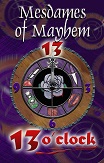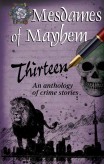This month we’re delighted to share Rosemary Aubert’s comedy mystery, “The Canadian Caper” set in Niagara Falls, New York. Her story appeared in our very first anthology, Thirteen, (Carrick Publishing, 2013.)
Why choose Thirteen as the title? It just so happened that there were 13 founding members of the Mesdames in, you guessed it, 2013. And 13 has turned out to be our lucky number!
Rosemary grew up in Niagara Falls, NY and considered Canada her second home. Her parents could buy Red Rose Tea in Canada and she and her siblings could get firecrackers, which were illegal in the USA. She drew on her cross-border experiences to create this very funny story
THE CANADIAN CAPER
by
Rosemary Aubert
At it again!
Mrs. Di Rosa manoeuvred her walker so that it was flush against the sill of the hallway window on the sixth floor of Global Towers—called Wobble Towers by her smarty-pants grandchildren. It was the only way she could free both hands in order to adjust her binoculars.
Damn cheap things. If they made them here, instead of some foreign country, they’d work better.
She fiddled with them until she could see the Canadian flag clear as a bell on the other side of the river. That was one of the things her daughter said was so great about Global Towers. That you could get such a good view of the bridge from Niagara Falls, New York to Niagara Falls, Canada.
“Could be the only place in the world where you can look out a window and see another country,” her helpful son-in-law had suggested when they’d signed her in.
Big deal!
She trained the binoculars on a vehicle stopped at the Canadian toll booth and gave the focus knob one more little shove. Good thing I don’t have arthritis! She tracked the long truck full of logs as it slowly made its way through the narrow entrance and onto the bridge.
“You still looking at them trucks?”
At the squeaky-voiced question coming from behind, Mrs. DiRosa jumped a mile. She let the binoculars fall back around her neck by their cord and grabbed her walker, turning to face the only person she could stand in Global Towers, her friend Meenie—or Teenie Meenie as Mrs. DiRosa’s grandchildren called their grandmother’s seventy-five-pound friend. Her real name was Minette, and a long time ago she’d left her home in Canada to live with her children before she, too, had been sent to the Towers. She still spoke with a French Canadian accent.
“What do you have to sneak up on me like that for?” Mrs. Di Rose said irritably. “Scared the dickens out of me and messed up my focus, too.”
“You still watchin’ them truckloads of frogs?
“Logs, you silly old thing. Not frogs, logs.”
“So why you watchin’ them now?” Meenie asked.
“Look,” Mrs. DiRosa said, forgetting her disgruntlement and eager to share her remarkable discovery. “See that truck coming through now?”
She handed the binoculars to Meenie who, being ten years younger, was more agile in every way and had no need of a walker to help her get close to the window. She held the binoculars to her eyes.
“Yeah, I see it,” she said, “It just got to the American side. One of them nice-looking young men in the uniform is talking to the driver. So what?”
“Get a load of the very top log. See anything funny about it?”
Meenie was quiet for a few seconds. Studying. “I see a mark on the top log,” she finally said. “A funny mark. Maybe like a hax hit it wrong.”
“Axe,” Mrs. DiRosa said. She had been correcting Meenie’s English now for eighteen and a half years without any noticeable effect. “Yes, that’s it.”
“What’s funny about a hax mark on a big log?”
“Nothing,” Mrs. DiRosa said. “Except that I’ve seen that mark on that log six times since I started counting.”
“What?”
“Meenie, that truck comes through here once every two weeks. And every single time, the same log is on top.”
Meenie leaned closer to the window. “Comes down from Canada with the same log on top? I don’t get it.”
Mrs. DiRosa took the binoculars from her friend’s hand. She trained them on the handsome young American customs official. She watched as he took a bunch of papers from the driver of the truck, glanced at them, nodded and waved the man on.
“They don’t keep them long enough with nine-eleven and all,” Mrs. DiRosa said. “No wonder there’s so many smugglers.”
Meenie laughed. “You read too many of them books. You got too much of imagination. There aren’t smugglers now. That’s stuff out of stories.”
“No, it isn’t,” Mrs. DiRosa said, suddenly remembering bits and pieces of a conversation. “Somebody was talking about smuggling just last week.”
Damn memory. Isn’t worth a thing. Should have eaten more carrots or something.
Meenie thought about it for just a minute. “I know,” she said. “It was at the Trans-border social last Tuesday. You know, when those old ladies come over from Canada for lunch at the Towers.”
“Yes, Meenie. You’re right. That’s it! They were talking about smuggling people out of foreign countries through Canada into the United States!”
“You don’t think that truck of logs has people hid in it?”
Mrs. DiRosa took another look out the window. The log truck was just pulling onto the Parkway, headed for points south. “The logs could be hollow or something like that. I wouldn’t be surprised. Foreigners are tricky. And getting into America is the thing they want most.”
“But it’s a big crime!” Meenie protested.
“Sure is,” Mrs. DiRosa said. She caught one last glimpse of the truck as it disappeared down the highway. “A whole load of criminals headed right into the heart of America.”
**
It wasn’t until the next day that Mrs. DiRosa finally figured out what they had to do. “Meenie, you’ve got to talk to that nice young customs man.”
Meenie laughed. “What I going to tell him—that my friend think people are coming in empty logs to America?”
“Don’t be a smarty-pants. I’d do it myself only I can’t walk. You can.”
“But I can’t talk that good. He won’t listen. He’ll just think I’m some old crazy person like Mr. Winters.”
Mr. Winters no longer lived at Global Towers because he’d wandered onto the bridge in his underwear on a February morning, swearing he was Canadian and wanted to die at home.
Meenie’s got a point.
“Okay,” Mrs. DiRosa said, “I’ve got it. I’ll write everything in a letter. How I’ve been watching the bridge for weeks now and have seen the same truck with the same logs go over time after time. I’ll put in the letter about how I can see that top log from above, which is how I can tell it’s the same log, when the customs men can’t. Then they won’t feel insulted or anything.”
“Don’t want to insult them, no,” Meenie agreed.
“Then you’ll do it?”
“To keep criminals out of America? Okay.”
It didn’t take long to write the letter. Meenie was right about Mrs. DiRosa reading a lot of books. One thing it did for you was make it easy to write. She signed the letter, “An American Citizen.” That sounded good.
Even though it would take Meenie a while to go all the way downstairs, then to the back door, then across the parking lot, then across the street, then onto the bridge and into the customs booth, Mrs. DiRosa got right up against the window the minute Meenie left her apartment.
It seemed to take forever before she finally caught sight of her. Luckily it wasn’t a busy day on the bridge. Even without the binoculars, Mrs. DiRosa could see the customs man take the envelope from Meenie. She watched him tear it open and read the letter. Then she saw him step into the booth and pick up the telephone. She lifted the binoculars. Now she could see that the man was smiling and nodding. Was he talking to his boss? Were they going to check things out?
She waited for what seemed like a long time. Finally the man put down the phone. He stepped out of the booth. He had something in his hand, which he gave to Meenie. He was talking to her. Mrs. DiRosa couldn’t see Meenie’s face too clearly. But she did see that Meenie’s shoulders were more slumped than usual. It didn’t seem like a good sign. It wasn’t a good sign either when the handsome young customs man patted Meenie on the head just like she was a dog.
**
“All he did was give me this,” Meenie said, holding up a small, bright American flag.
“What did he say?” Mrs. DiRosa demanded. They’d already been through this several times, but she wanted to make sure.
“I told you,” Meenie said, twirling the flag in her fingers until Mrs. DiRosa reached out and made her stop. “He say old ladies don’t always see too good and not to worry because he’s protecting America for us.”
Mrs. DiRosa thought about it for one minute longer. Then she made up her mind. “That log truck has something wrong about it and I’m not going to give up until we find out what it is.”
“How come you always say ‘we’?” Meenie asked, beginning to twirl the flag again.
“There’s only one thing we can do now,” Mrs. DiRosa announced.
“Oh, no. What?”
“We have to go to Canada.”
“But you can’t even walk!”
“We will find a way.”
“Stop saying we,” Meenie said again, but of course, Mrs. DiRosa wasn’t listening. She was thinking again.
**
The first thing they had to do was borrow a wheelchair from the office. It wasn’t easy because for several years now, Mrs. DiRosa had told the Global Towers’ social worker that the only place she was going to be wheeled was to her grave.
“Where you be goin’ then, sweetie?” the social worker asked. She was a nice young girl with a master’s degree in social work from some university in Georgia.
Too bad they don’t teach English in college any more. “To the library,” Mrs. DiRosa lied, and Meenie, who was standing behind her, nodded.
“Well, you all be careful now, you hear?”
“Of course,” both the old women said sweetly and simultaneously.
“Good, we fooled her,” Mrs. DiRosa told Meenie as she got herself down into the chair and arranged a blanket around her legs. “Now we’ve got to get going. The plan’s simple. We just wheel right on out the back door, over the parking lot, across the street—be sure to watch both ways—and onto the bridge. On the American side we’ve just got to pay the toll—no questions asked. Once we get over to Canada, I’ll tell them you don’t speak any English. That way I can do all the talking.”
“What if they find out we’re missing from the Towers?” Meenie wasn’t nearly as sure of the plan as Mrs. DiRosa.
“No problem. Today’s Tuesday—Trans-border social day. It’s Canada’s turn. I signed us both up. That bus driver’s so lazy, he never checks how many there are. And if the Canadians have any questions, we just say we missed the Trans-border Social Club bus.”
Meenie shook her head. “I don’t think…”
“You don’t have to think,” Mrs. DiRosa said. “You just have to push.”
**
It was cold going across the bridge even though it was the middle of June. The wind off the river smelled a certain way that Mrs. DiRosa remembered from long ago. It had been almost twenty years since she’d gone across the bridge in any way except by her daughter and son-in-law’s car. She remembered Mr. DiRosa and all the times they went to Canada together in the old days, bringing back good Canadian tea and jam and cheese and toffee that killed your teeth and—for the Fourth of July—nice Canadian firecrackers that you had to hide under your blouse to get across. The memory of it made tears come to her eyes and the tears gave her a good idea.
“Don’t say a thing, Meenie,” Mrs. DiRosa reminded her friend as they came within a few yards of the Canadian customs booth. They could see the outline of a person behind the glass of the booth, but when the person stepped out with a little smile on her face, Mrs. DiRosa was surprised. She’d expected the Canadian customs officer to be a handsome young man just like the American one. Only it was a young woman instead. A smart-looking young woman.
“Well now, ladies, what can I do for you?” the girl said. She looked friendly, but suspicious, too. Mrs. DiRosa was glad about the new angle to her plan.
She sniffled and squeezed her eyes shut, and made a few of the tears that were still in her eyes run down her cheeks. “I have come home to die,” she said.
She could feel the back of the wheelchair wiggle a little bit, but Meenie kept her mouth shut.
The young woman looked shocked. “Come in here, ladies,” she said, her voice a little shaky, “just wait for a moment, please.”
She opened the door to the customs office. Meenie wheeled Mrs. DiRosa in. The customs officer disappeared down a narrow hall.
The minute she was out of sight, Meenie came around the front of the wheelchair. She was good and mad. “What’s the matter with you?” she demanded of Mrs. DiRosa. “Why you tell them such a crazy thing? You want to be like Mr. Winters? How that fix the smugglers?”
“Calm down,” Mrs. DiRosa said. “Remember how they got all those officials to come to the bridge when old Winters went crazy? They’ll call the same ones now. The minute the bigwigs get here, we’ll spill the beans.”
They heard footsteps coming down the hall, the light steps of the female officer and then heavier steps.
“Here they come.”
**
It was in all the papers: the Niagara Gazette, the Buffalo Evening News, even the papers up in Toronto and the Pennysaver. Mrs. DiRosa cut out the articles and taped them up on her wall. They showed her and Meenie talking to a reporter, and they said how they’d tipped off the bridge people and broken up a ring of people smugglers.
Mrs. DiRosa’s daughter was hopping mad at first. “I signed you up at the Towers so you would be safe, and look what you do—running off after smugglers.”
“I didn’t run after them, I just turned them in,” Mrs. DiRosa said.
“Well, I’m taking those binoculars away right now. I don’t want you to put yourself at risk like this ever again”
Mrs. DiRosa thought fast. “I’ll give them in to the penny sale,” she said. “Then somebody else can benefit by them.”
Her daughter was about to answer that when the phone rang. It was a TV reporter from New York. She forgot about the binoculars when she found out Mrs. DiRosa was going to be on the news right across the country.
“You’re hot now, Grandma,” her grandchildren said when they heard that.
Smarty-pants.
Mrs. DiRosa manoeuvred her walker so that it was flush against the windowsill. She lifted the binoculars to her eyes.
“What you lookin’ at now? More trucks?”
“Course not,” she said to Meenie. “I’m just checking to make sure these are all right before I give them in for the penny sale. You know how mad that social worker gets when people donate things that don’t work.”
Mrs. DiRosa leaned against the walker and freed her other hand to fiddle with the focus. She could see the Canadian flag clear as a bell across the river.
Good thing they teach people to respect their elders in Canada.
That’s what she was thinking when she saw it again. Just as she had seen it twice before: a van driven by a man pulled into one of the parking lots a little ways down the river from the entrance to the bridge. The man seemed to disappear into the back of the van. Then after a little while, the front door of the van opened and a woman walked out. No sign of the man anymore. Like he had up and disappeared altogether. The woman walked toward the bridge, paid the toll and began to walk over the bridge right toward America.
“Lots of crooks in this world, Meenie,” Mrs. DiRosa said.
“We gonna need that wheelchair again?” Meenie asked.
Could be, Meenie, could be….




























